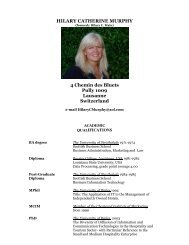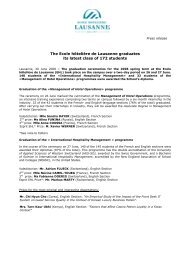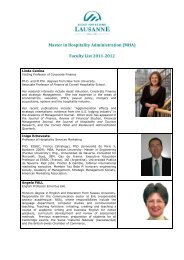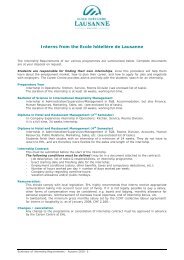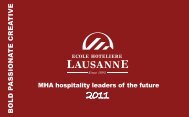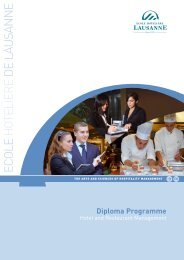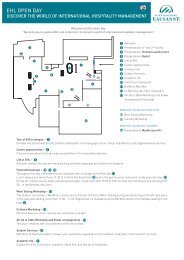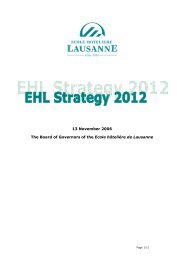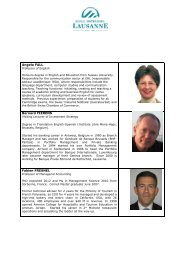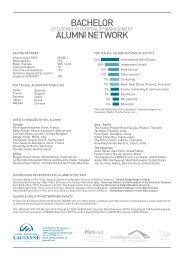EHL Course Catalogue 2011-2012 - Ecole Hôtelière de Lausanne
EHL Course Catalogue 2011-2012 - Ecole Hôtelière de Lausanne
EHL Course Catalogue 2011-2012 - Ecole Hôtelière de Lausanne
You also want an ePaper? Increase the reach of your titles
YUMPU automatically turns print PDFs into web optimized ePapers that Google loves.
managers engage in when strategizing. Through case study discussions, reflective journals,<br />
interactive strategic planning sessions with hospitality industry executives, and individual and team<br />
exercises, stu<strong>de</strong>nts will <strong>de</strong>velop their strategy-making competences and strategic thinking<br />
capabilities. They will un<strong>de</strong>rstand not only how, according to the theory, they should analyze firms<br />
and their competitive situations in or<strong>de</strong>r to <strong>de</strong>velop a competitive advantage, but also how, in reality,<br />
practitioners actually do so. They will learn the fundamental strategic management tools and<br />
techniques, but also to question the prescribed wisdom, <strong>de</strong>velop their own analytical tools, and<br />
combine analysis, synthesis and innovative thinking in or<strong>de</strong>r to <strong>de</strong>velop solutions to strategic<br />
challenges facing hospitality firms and industry sectors.<br />
Entrepreneurship<br />
45 hours of contact – 3 semester credits<br />
� Summary<br />
The purpose of this course is to address key areas related to the entrepreneurial process. Issues and<br />
questions to be addressed inclu<strong>de</strong>:<br />
- The entrepreneurial mindset: what does being an entrepreneur mean?<br />
- I<strong>de</strong>ntifying entrepreneurial opportunities;<br />
- How to write a business plan;<br />
- How to raise funds in or<strong>de</strong>r to finance an entrepreneurial venture;<br />
- Taking over an existing business as an alternative to creating a new one.<br />
Hotel Benchmarking<br />
30 hours of contact – 2 semester credits<br />
� Summary<br />
This module introduces various benchmarking tools, approaches and techniques. It provi<strong>de</strong>s<br />
stu<strong>de</strong>nts with the necessary skills to conduct benchmarking initiatives, assists them in analyzing<br />
research for competitive intelligence and provi<strong>de</strong>s them with the knowledge to successfully plan and<br />
implement process improvements for organizational best practice and improved corporate<br />
performance. The aim of the course is to provi<strong>de</strong> stu<strong>de</strong>nts with a critical un<strong>de</strong>rstanding of the role of<br />
benchmarking in the hotel industry and the tools and un<strong>de</strong>rstanding to conduct benchmarking<br />
exercises and to show how the resulting findings can be incorporated into strategic planning<br />
processes and unit level action plans.<br />
Organisational Behaviour<br />
30 hours of contact – 2 semester credits<br />
� Summary<br />
Managing people for productivity is an ongoing challenge in a rapidly changing business<br />
environment. Being able to <strong>de</strong>al successfully with the “people factor” requires a solid un<strong>de</strong>rstanding<br />
of the fundamental theories and frameworks of organizational behaviour (OB). This course will focus<br />
on the essential factors that drive employee satisfaction and productivity. Lea<strong>de</strong>rship is of course a<br />
central topic and the course covers a range of lea<strong>de</strong>rship areas, including different lea<strong>de</strong>rship styles,<br />
contingency theories of lea<strong>de</strong>rship, team lea<strong>de</strong>rship, and issues of participative <strong>de</strong>cision-making and



